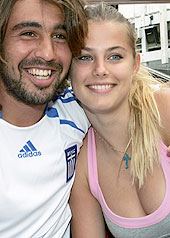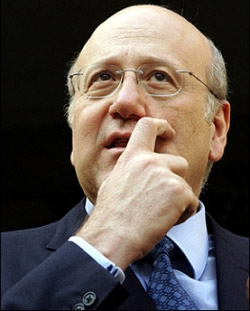[2 March 2006 update: The FSA slapped both Philippe Jabre and GLG with a £750,000 fine, according to today's
Independent newspaper]
[28 February 2006 update: French regulators are investigating Phillipe Jabre, as part of a wider insider trading probe of London-based hedge funds,
The Wall Street Journal reported today.]
[20 February 2006 update: Phillippe Jabre reportedly quit as a director of GLG Partners.]
Philippe Jabre, the most successful Lebanese banker in the world today is being investigated by the Financial Services Authority (FSA) of the UK for profiting from privileged information on two occasions.
“Philippe has been made a scapegoat,” said George Asseily, a London based Lebanese banker, to the Sunday Times today.
Jabre, who co-owns GLG Partners, Europe's third-biggest hedge fund with $11.5 billion under management, is a major donor to educational institutions and humanitarian causes in Lebanon.
The verdict will be delivered at the end of the month and Jabre may be both fined and banned from trading in the City of London.
The Sunday Times wrote a full page story on Jabre in its business section today. Following is an excerpt:
"“PHILIPPE JABRE was born into a prominent Maronite Christian family in Lebanon on May 23, 1960. “His family owns land near Mt Lebanon,” said George Asseily, a Lebanese banker. “They owned a brewing business which they recently sold to Heineken.”
After studying at the American University of Beirut, Jabre earned an MBA from Columbia University in New York, trained at JP Morgan, then went to work for Banque Nationale de Paris in London. There he became an expert in trading an arcane species of bonds — bonds convertible into shares.
“Philippe was a star and a popular one,” said Neil Tunley, now an executive at the financial firm Charles River Development, who worked for him at BNP.
Jabre joined GLG as a partner two years after the hedge-fund group was founded in 1995. The firm was part of the first wave set up after the industry’s founding fathers, including George Soros and Warren Buffett, blazed a trail from the 1960s to the 1980s.
GLG’s three original partners are Noam Gottesman, 44, an Israeli-American whose family built a commodities business in Amsterdam, Pierre Lagrange, 43, a Belgian, and Jonathan Green, 42, a British broker trained at James Capel.
All three worked at Goldman Sachs in London from the mid-1980s to the mid-1990s as brokers for private clients in Europe and the Middle East. In 1995, the three decamped after getting backing from rival Lehman Brothers to start their own business. “They left Friday. They were in business Monday. It was a long time before Goldman would do business with them,” said a former colleague.
Eventually, tensions abated. Goldman became one of GLG’s prime brokers. It did not hurt that Green is a personal friend and business partner of Michael Sherwood, the London-based co-chief executive of Goldman. Green and Sherwood are co- investors in Sepura, a digital-radio company, and Bane Corp, through which they lease private aircraft.
Like most hedge-fund businesses, GLG is based offshore and discloses no meaningful figures about sales, earnings or net value. And, as with most, it makes its money investing other people’s capital and charging clients an annual administration fee of 1%-2% of funds under management, then taking 20% of the profits it generates.
In the late 1990s GLG consistently earned double-digit returns for clients — partly on the back of Jabre’s Market Neutral fund. The fund, which is listed on the Dublin exchange, took hedged positions in convertible bonds.
Then in 2000 the three original partners plus Jabre formed a new company. The four men bought out all but 20% of the Cayman Islands-based parent firm and stuck the stakes in their personal offshore trusts.
The dotcom bust was bad for average investors. It was bad for most pension funds which got stuck holding shares in technology, phone and media companies — but it was good for hedge funds which beat the sinking stock and bond-market indexes.
Over the past five years the hedge-fund community has grown from fewer than 1,000 to 8,000 firms. Funds under management have doubled to £1,100 billion.
In November 2002 Vivendi Universal, the French media giant, was financially overstretched and desperately in need of cash. It employed the London arm of Germany’s Deutsche Bank to manage a sale of convertible bonds. Following industry practice, Deutsche canvassed hedge funds and other investors to get a sense of what size of a Vivendi convertible-bond issue would be digestible at what price. In the course of these conversations, a Deutsche banker spoke to Jabre and his counterparts at several other hedge funds.
The deal was successful. Vivendi has recovered from its financial emergency. But in the three days before the convertible-bond sale was launched Vivendi shares fell 14% as investors sold stock ahead of a dilution of their value as a result of new securities coming onto the market.
The French financial regulator AMF began investigating this fall in Vivendi’s share price. In January 2005 it issued a so-called notice of grievance against GLG and several other hedge funds. Its investigation continues.
TWO months later, more or less the same thing happened with GLG, Sumitomo, and the managers of the Japanese bank’s March 2003 stock sale. In addition to Goldman, the lead manager, Sumitomo also hired JP Morgan and Daiwa Europe to help out with the sale.
In the 1980s Sumitomo was a financial juggernaut. In 1986, when Goldman Sachs needed capital to expand, Sumitomo provided it, buying a 12% stake in the Wall Street firm. Then the Japanese economy imploded. Property values crashed and businesses defaulted. Sumitomo and most Japanese banks were stuck with billions in bad loans.
In the 1990s Japanese banks came under increasing government pressure to clean up their balance sheets. The government set a deadline for problems to be solved by March 31, 2003.
To meet this deadline, Sumitomo merged with another troubled Japanese bank and restructured. In January 2003 Goldman Sachs took a stake, buying $1.3 billion of the Japanese bank’s preferred stock convertible into ordinary stock.
Rumour in the City was that Sumitomo was planning a second sale of preferred stock convertible into common stock — this one on the open market. The talk resulted from soundings being taken by Goldman, JP Morgan and Daiwa Europe. Bankers at the three firms were speaking to London hedge funds to gauge interest in the deal.
The FSA has rules regarding such conversations. If a discussion between a hedge-fund manager and investment banker is vague enough, it is allowed. If, for instance, an investment banker tells a hedge-fund manager, “a large multinational corporate is thinking of doing something in the next few months. What would be your appetite?” that would not stop the hedge-fund manager from trading.
Hedge-fund managers could then try to guess which company was about to sell stocks or bonds and position themselves accordingly. If, on the other hand, an investment banker tells a hedge-fund manager, “Sumitomo is planning a $2.9 billion sale of preferred stock in March” that is privileged information. Passing on such information is not in itself illegal, but it cannot be acted on. In the City it is called “taking an investor over the wall”. Once taken “over the wall”, hedge-fund managers are not allowed to trade in the securities of a company about to do a deal. It is the February 24, 2003 conversation between GLG’s Jabre and Goldman’s London banker John Rustum about Sumitomo three weeks before the sale of its stock became public knowledge that is at the heart of the FSA investigation into GLG and its star trader. Making its case against Jabre and GLG, the FSA has reviewed transcripts of taped conversations. It has matched the time of these conversations with the time Jabre traded in Sumitomo securities. Buy and sell orders are recorded on electronic trading platforms and by tickets written by investors and brokers. In the February 24, 2003 conversation, the FSA’s investigators allege that Rustum supplied details on the forthcoming Sumitomo stock sale. Rustum then said to Jabre: “You’re over the wall,” meaning he could not trade Sumitomo securities until the sale was announced. FSA investigators told the regulator’s panel that Jabre replied: “I already have a position in Sumitomo.” The regulator’s investigators said Jabre then asked Rustum if he could adjust his pre-existing position in Sumitomo securities, and Rustum replied: “I’ll get back to you on that.” Lawyers for Jabre argued that GLG’s star trader took this to mean he had not been “taken over the wall” after all. So, when he dealt further in Sumitomo securities, he was not breaking the law. The FSA’s lawyers argued that, whatever the vagueness on Rustum’s part, Jabre was “over the wall”.
ON JANUARY 9 Jabre took leave from GLG, citing his knee injury and the need to marshal his defences against the FSA. Sources close to the regulator say the FSA’s regulatory decisions committee will issue its decision by the end of the month. The star hedge- fund trader could face a record fine and a bar from working in the City or he could be cleared. The FSA is also considering its decision about GLG. This may depend on how the firm itself deals with Jabre. There is speculation that GLG wants him to resign and sell his stake in the firm. Jabre’s friends are already rallying round. They believe he is a victim of the FSA’s desire to claim a high- profile scalp, and that his partners at GLG are willing to distance themselves from him to protect the firm. “Philippe has been made a scapegoat,” said the Lebanese banker Asseily. How the FSA handles the announcement of its finding will go a long way toward establishing the credibility of its investigation and the regulator’s reputation. It may also give an indication of whether the FSA sees the affair as a one-off or the first round in an ongoing effort to lift the lid on suspicions of insider trading among a circle of hedge-fund managers and investment bankers."









